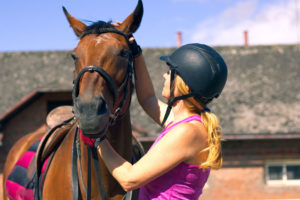If there is one thing Wellington, Florida, is known for, it’s the area’s world-class equestrian community. Folks in these parts love horseback riding, and who can blame them? It’s great exercise for the entire body and invigorating for the spirit.
However, unless you follow the appropriate measures, you can sustain a serious injury while horseback riding. In fact, more than 48,000 Americans are treated for horseback riding injuries each year, according to the National Electronic Injury Surveillance System (NEISS). Often, these injuries result from riders attempting to break a fall – but instead, they suffer bruises, sprains, strains, and fractures to the wrist, shoulder, or elbow. More severe, sometimes life-threatening, horseback riding injuries include damage to the pelvis, spine, and head.
To help prevent horseback riding injuries, the American Academy of Orthopaedic Surgeons (AAOS) offers these suggestions:
- Always wear a helmet that meets industry safety standards when horseback riding.
- Also be sure to wear well-fitted, sturdy leather boots with a minimal heel. Do not wear loose-fitting clothing.
- Before you mount, inspect all riding equipment to be sure it isn’t damaged and that it has been secured properly. The saddle and stirrups should be appropriate for your size and properly adjusted.
- Using safety stirrups that break away in the event of a fall might be a good idea for children and inexperienced riders.
- Always supervise young horseback riders.
- If you are an amateur rider, stick with open, flat terrain or a monitored riding arena.
- Do not attempt jumps or stunts without supervision, as these require a much higher level of riding skill.
- If you fall off your horse, roll toward the side when you hit the ground to avoid being trampled.
- Never ride a horse when you’re tired, on medication, or under the influence of alcohol.
- Keep in mind that horses are flight animals that will bolt and take off running from sudden noises or movements. So be alert for anything that might suddenly startle your horse, and be ready to respond quickly.
- When trail riding, do not stray from that path. Also, be sure to heed any warning signs.
- Never stand or walk behind a horse. It might provoke the horse to kick. Horses are less threatened when approached at their shoulder.
- You can tell a lot about a horse’s disposition or condition by watching its head, especially its ear movements. A horse will react to a sound by directing one or both ears toward the sound. Likewise, if the horse is sleeping, sedated, or under the weather, the ears will be held to the side. And if the horse’s ears are pinned back, it may feel threatened and/or angry.
- When providing the horse with a treat, keep your hand open and your fingers flat and extended. Otherwise, the horse might unintentionally bite and break your fingers.
Superior Family Health Care in Wellington, Florida
At Advanced Medical Clinic, PA, we pride ourselves on providing personalized, quality health care for your entire family. To learn more about us and the primary services we offer, or to arrange a visit to our friendly Wellington, Florida clinic, call us at (561) 434-1935, or request an appointment using our online form. We are always happy to serve you.


